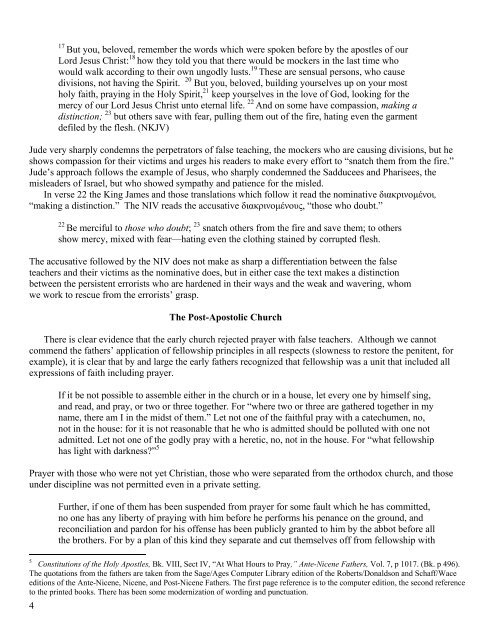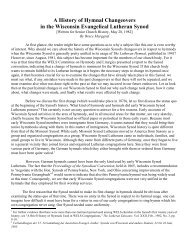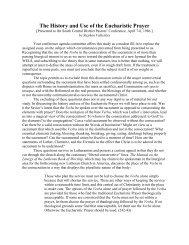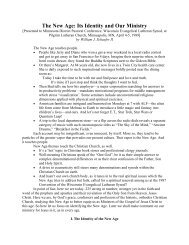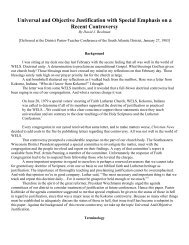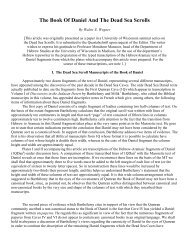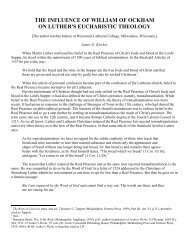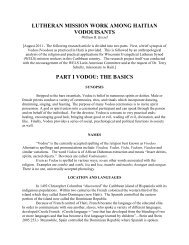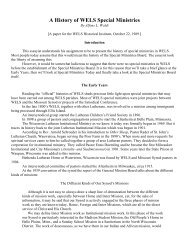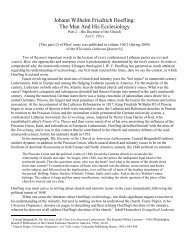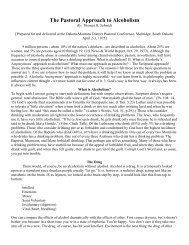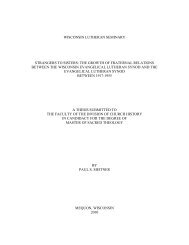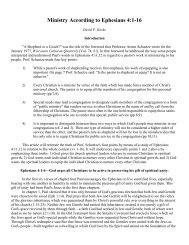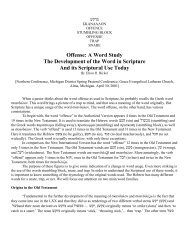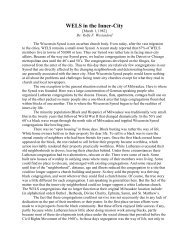The Synodical Conference and Prayer Fellowship - Wisconsin ...
The Synodical Conference and Prayer Fellowship - Wisconsin ...
The Synodical Conference and Prayer Fellowship - Wisconsin ...
Create successful ePaper yourself
Turn your PDF publications into a flip-book with our unique Google optimized e-Paper software.
4<br />
17 But you, beloved, remember the words which were spoken before by the apostles of our<br />
Lord Jesus Christ: 18 how they told you that there would be mockers in the last time who<br />
would walk according to their own ungodly lusts. 19 <strong>The</strong>se are sensual persons, who cause<br />
divisions, not having the Spirit. 20 But you, beloved, building yourselves up on your most<br />
holy faith, praying in the Holy Spirit, 21 keep yourselves in the love of God, looking for the<br />
mercy of our Lord Jesus Christ unto eternal life. 22 And on some have compassion, making a<br />
distinction; 23 but others save with fear, pulling them out of the fire, hating even the garment<br />
defiled by the flesh. (NKJV)<br />
Jude very sharply condemns the perpetrators of false teaching, the mockers who are causing divisions, but he<br />
shows compassion for their victims <strong>and</strong> urges his readers to make every effort to “snatch them from the fire.”<br />
Jude’s approach follows the example of Jesus, who sharply condemned the Sadducees <strong>and</strong> Pharisees, the<br />
misleaders of Israel, but who showed sympathy <strong>and</strong> patience for the misled.<br />
In verse 22 the King James <strong>and</strong> those translations which follow it read the nominative διακρινομένοι,<br />
“making a distinction.” <strong>The</strong> NIV reads the accusative διακρινομένους, “those who doubt.”<br />
22 Be merciful to those who doubt; 23 snatch others from the fire <strong>and</strong> save them; to others<br />
show mercy, mixed with fear—hating even the clothing stained by corrupted flesh.<br />
<strong>The</strong> accusative followed by the NIV does not make as sharp a differentiation between the false<br />
teachers <strong>and</strong> their victims as the nominative does, but in either case the text makes a distinction<br />
between the persistent errorists who are hardened in their ways <strong>and</strong> the weak <strong>and</strong> wavering, whom<br />
we work to rescue from the errorists’ grasp.<br />
<strong>The</strong> Post-Apostolic Church<br />
<strong>The</strong>re is clear evidence that the early church rejected prayer with false teachers. Although we cannot<br />
commend the fathers’ application of fellowship principles in all respects (slowness to restore the penitent, for<br />
example), it is clear that by <strong>and</strong> large the early fathers recognized that fellowship was a unit that included all<br />
expressions of faith including prayer.<br />
If it be not possible to assemble either in the church or in a house, let every one by himself sing,<br />
<strong>and</strong> read, <strong>and</strong> pray, or two or three together. For “where two or three are gathered together in my<br />
name, there am I in the midst of them.” Let not one of the faithful pray with a catechumen, no,<br />
not in the house: for it is not reasonable that he who is admitted should be polluted with one not<br />
admitted. Let not one of the godly pray with a heretic, no, not in the house. For “what fellowship<br />
has light with darkness?” 5<br />
<strong>Prayer</strong> with those who were not yet Christian, those who were separated from the orthodox church, <strong>and</strong> those<br />
under discipline was not permitted even in a private setting.<br />
Further, if one of them has been suspended from prayer for some fault which he has committed,<br />
no one has any liberty of praying with him before he performs his penance on the ground, <strong>and</strong><br />
reconciliation <strong>and</strong> pardon for his offense has been publicly granted to him by the abbot before all<br />
the brothers. For by a plan of this kind they separate <strong>and</strong> cut themselves off from fellowship with<br />
5 Constitutions of the Holy Apostles, Bk. VIII, Sect IV, “At What Hours to Pray,” Ante-Nicene Fathers, Vol. 7, p 1017. (Bk. p 496).<br />
<strong>The</strong> quotations from the fathers are taken from the Sage/Ages Computer Library edition of the Roberts/Donaldson <strong>and</strong> Schaff/Wace<br />
editions of the Ante-Nicene, Nicene, <strong>and</strong> Post-Nicene Fathers. <strong>The</strong> first page reference is to the computer edition, the second reference<br />
to the printed books. <strong>The</strong>re has been some modernization of wording <strong>and</strong> punctuation.


